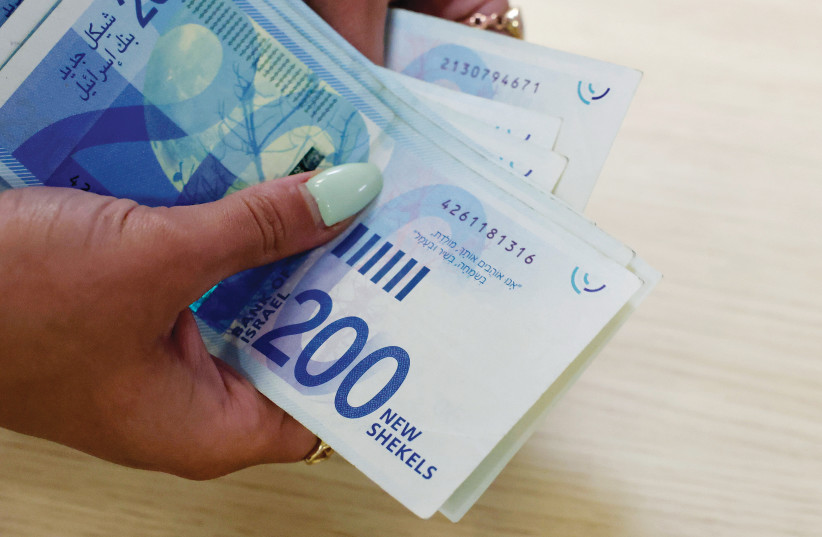What an embarrassment. Eager to announce its grand return to the space race, Russia fired a robotic spacecraft to the moon, only to soon admit that the vessel lost its way and “ceased to exist.”
Considering its context – Russia’s military failure to defeat a smaller neighbor and its industrial failure to produce Iranian-quality drones – the moon-landing failure offers a lesson about the price of political adventurism, a lesson that is now relevant also in the Jewish state.
In its previous incarnation, as the Soviet Union, Russia sent to outer space mankind’s first satellite and people; but with the American moon landing in 1969, Moscow lost its leadership of the space race.
Now, fueled by the same nationalist vanity and imperial obsession that made him invade neighbors small and big, President Vladimir Putin set out to restore Russia’s place in the cosmos. He failed in the heavens as he failed on Earth.
Incidentally, the lunar failure came just when Russia’s containment of Western sanctions began to crack. The ruble, which entered the war at 75 to the dollar, initially plunged, but later rose some 25%, to 54 to the dollar last summer, reflecting Russia’s successful bypassing of Western sanctions through deals with China, India, and Brazil.

Since last summer, however, the ruble steadily lost altitude, so much so that while Russia’s spacecraft searched for the moon, its currency was trading at 100 to the dollar. That’s a one-cent ruble.
Narrowly speaking, this devaluation is the result of Western powers’ demand that anyone buying Russian oil pay a maximum of $60 per barrel. More broadly, the ruble’s plunge reflects trade partners’ reluctance to use the currencies of adventurous governments.
That, in brief, is the economic price of political misadventure. The currency markets are telling Russia that it set out to do things it can’t do, at prices it can’t afford.
THE MARKETS’ treatment of Russia is not special. In the 1980s, they did the same thing to Israel, after its invasion of Lebanon.
While the scales were entirely different in every possible parameter – the sizes of the countries, populations, and casualties – in terms of the plan and the conceit that animated it, Israel did then what Russia did last year, invading a neighboring country, confident it will quickly rearrange its government to its own benefit.
The military results were different. Israel did defeat the Syrian army that camped in Lebanon – but the political results were much like Putin’s. He failed to reinvent Ukraine, and Israel failed to reinvent Lebanon.
Also similar was the economic backlash.
Having swallowed more than it could digest, the Israeli economy spun out of control, so much so that inflation by 1985 reached 415% and foreign currency reserves dwindled so fast that Israel reached the brink of insolvency.
The same dynamics happened in the US in 1971, when its Vietnam adventure created deficits and fanned the inflation that made Richard Nixon sever the gold standard that governed the dollar’s exchange rate.
What, then, are the markets saying now about Israel’s latest political adventure?
The markets are punishing Israel's latest adventurism
THE SHEKEL, until this year one of the world’s strongest currencies, has been sliding, slowly but steadily, since January 26, three weeks after Justice Minister Yariv Levin unveiled his plan to disempower and conquer the Supreme Court.
Back then, the exchange rate was NIS 3.37 to the dollar. This week, the shekel’s dollar rate crossed the NIS 3.8 threshold, an aggregate depreciation of 13%.
Fortunately, this is nothing remotely like what this economy went through in the 1980s or what Russia is experiencing now.
Moreover, with inflation, unemployment, and growth at roughly 3.5% each, this economy for now remains solid. By contrast, Sweden, Holland, and Germany all have negative growth rates right now; British, Austrian, and Czech inflation rates are more than twice Israel’s level, and so is joblessness in France, Greece, and Spain.
Even so, the shekel’s decline is a warning sign. The markets are following closely what Israel’s politicians are up to, and they smell trouble.
The shekel’s prominence, reflected also by $201 billion in foreign currency reserves, one of the highest per-capita rates in the world, took decades to build.
The shekel’s ascendancy began with the 1985 austerity plan and ripened with former Bank of Israel governor Jacob Frenkel’s tough monetary leadership during the 1990s. It then matured the following decade with then-finance minister Benjamin Netanyahu’s market reforms.
The Netanyahu of those days was an economically principled man who effectively told ultra-Orthodox men to go to work while he slashed social spending, cut taxes, reformed the long-term savings industry, and privatized El Al, ZIM, the oil refineries, and the pension funds.
That Netanyahu entered the Treasury with the dollar buying NIS 4.81 and left it with the dollar devalued to NIS 4.48.
Now the shekel is facing a different Netanyahu, one who consciously provoked the markets, twice: first, when he had the Treasury rotate between two sectarian ministers – one a messianic zealot, the other a convicted crook; and second, when he green-lighted Levin’s anti-judiciary assault.
The shekel’s strength this century reflected not only Israel’s technological originality and entrepreneurial drive but also its judiciary’s independence and reliability, which are crucial for foreign investors.
Fortunately, the assault on the judiciary was stalled by the masses who took to the streets determined to block it. That’s why the shekel did not collapse. However, it did slide, well more than 10% in hardly 10 months. It takes no economist to imagine what will happen if the assault on the judiciary resumes and matures.
The writing is on the wall, as the financial markets say that the prudent Netanyahu they once knew has – like Putin’s spacecraft – lost his way and ceased to exist.
www.MiddleIsrael.net
The writer, a Hartman Institute fellow, is the author of the bestselling Mitzad Ha’ivelet Ha’yehudi (The Jewish March of Folly, Yediot Sefarim, 2019), a revisionist history of the Jewish people’s political leadership.
